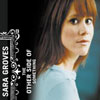| > cMusicWeb.com > Folk > Sara Groves > The Other Side of Something |
|


[ the other side of something ]
|
|
|||
|
|
|
|
|
|
THEMUSIC
|
|||
|
|
|||
|
|
|||
|
CURRENTS
|
|||
|
|
|||
|
|
|||
|
SEARCH
|
|||
|
|||
|
|
|||
|
cMUSICMAIL
|
|||
|
|||
|
|
|||
THE OTHER SIDE OF SOMETHING (2004)
 Inspire: To breathe into.
Inspire: To breathe into.That is how, back in 1828, Noah Webster defined "inspire." Those words convey the power of creation, the wonder of the Holy Scriptures, the mystery of our salvation. They capture the heart and soul of every writer, for we all wish to breathe power, wonder, and mystery into our readers.
Sadly, most modern dictionaries and people define "inspire" as a transfer of emotion. To inspire people, we often think, is to make them feel happy. Similarly, inspirational music (especially the Christian variety) is designed to give listeners a temporary high, much like a drug that eases the pain for a few minutes before giving way to a more intense hunger. It offers very little in the way of true satisfaction and allows listeners to stay within a stagnant comfort zone.
Thankfully, there are songwriters who do not bend the knee to modern demands, who are determined to give people what they need instead of what they want. As The Other Side of Something aptly demonstrates, Sara Groves is one such songwriter. Though the theme of faith through suffering and discouragement often leads songwriters into areas of cliché and sweet-as-sugar nothings, Sara deftly avoids those pitfalls. Instead, The Other Side of Something provokes thought and exemplifies grace with beauty. In short, it is truly inspirational.
These songs are not for the faint of heart, for they ask hard questions and voice the pain that we inevitably feel as we walk down life's road. Sara points out that while our flesh idolizes comfort and seeks to preserve it at all costs, our regenerated hearts know that we must stand up and face the purifying fire of God ("Jeremiah"). As the fire burns within us, we realize—with great joy!—that we are no longer slaves to sin, but slaves to Christ ("Compelled"). This truth never changes, but we are led to doubt it when life repeatedly knocks us down and bruises our body ("What I Thought I Wanted" and "The Boxer"). In the middle of this, we are also called to love those people God has placed in our lives, and that is often a battle in-and-of-itself ("Roll to the Middle"). All of these struggles work to make us stronger, however, and with the help of our loved ones and the grace of God, we are able to grow into the beauty God has planned for us ("Undone" and "Like a Skin"). And after we see this, what can we do but praise God? It is, after all, only by His grace that we can grow, so let us praise and thank Him ("Come Thou Fount").
The Other Side of Something generally flows well, aided by the production skills of Nate Sabin and Charlie Peacock. While their production is a slick folk-pop sound, it is not bubblegum for your ears. The tone of the music matches the lyrics and creates a sonic atmosphere that complements the lyrics without overpowering them. However, there are a couple songs ("Esther" and "All I Need") where the general theme of the record seems to be lost or ignored. Instead of driving home their well-intentioned messages (the importance of missions and our rampant materialism, respectively), these tunes interrupt the flow that the rest of the album has carefully constructed.
Despite those slight drawbacks, it is impossible not to leave this album encouraged. As the album opener "One Thing I Know" reminds us, God will not turn away from this good work He has begun in us. No matter what pain we must endure, no matter how many times we fall, God will be faithful to His promise. This truth permeates The Other Side of Something, offering listeners hope no matter how weak, how dull, or how simplistic their lives may seem.
- Jason Ewert
July 2004
July 2004
Articles written by the staff.
Maintained by WebMaster Dan Ficker.
Site Design by da Man
All Material © 1999-2005 Different Media LLC
Support cMusicWeb.com